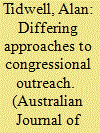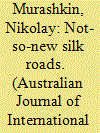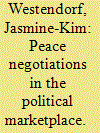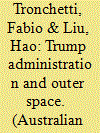|
|
|
Sort Order |
|
|
|
Items / Page
|
|
|
|
|
|
|
| Srl | Item |
| 1 |
ID:
160941


|
|
|
|
|
| Summary/Abstract |
Both Australia and New Zealand, in addition to engaging with the US executive branch, also protect and advance their bilateral relationship by engaging with the US Congress. Since 1987, Australia has pursued congressional outreach, or diplomatic lobbying, to protect and advance its security and trade interests. As a result, Australia has won both security and trade benefits. New Zealand's congressional outreach, on the other hand, has had a more challenging task of improving bilateral relations due, in part, to US objections to New Zealand's anti-nuclear policy. This article extends existing research on Australian and New Zealand congressional outreach, develops a framework for examining embassy-based congressional outreach and, through comparative analysis of Australian and New Zealand congressional outreach, gives greater insight into the nature and character of their efforts on Capitol Hill.
|
|
|
|
|
|
|
|
|
|
|
|
|
|
|
|
| 2 |
ID:
160937


|
|
|
|
|
| Summary/Abstract |
Since the Cold War, South-East Asia has been marked by a period of relative calm and stability. Yet this peace belies ongoing tensions, mistrust and stress in the Association of Southeast Asian Nations (ASEAN) and among its member states. Within the scholarship on ASEAN, not enough attention is devoted to these underlying currents. How and in what way do tensions stress the ASEAN norms? What are some of the coping mechanisms adopted by ASEAN and its member states? Engaging with the scholarship on norms, the author contends that changes wrought in this relationship are both extra- and intra-mural. These have accelerated as contentious issues—particularly the South China Sea disputes—gain more visibility. The author argues that ASEAN is put under pressure, firstly, through a more muscular Chinese foreign policy that disrupts but does not yet break the fundamental norms of ASEAN and, secondly, through internal contestation over ASEAN norms that challenges the meaning of these norms. Essentially, the article gives an account of how internal and external pressures are burdening ASEAN norms but yet remain durable because of resistance against duress by the bloc and member states. This is done through an examination of instances where the established order and practices in the region were disturbed, and the response to this disturbance.
|
|
|
|
|
|
|
|
|
|
|
|
|
|
|
|
| 3 |
ID:
160949


|
|
|
|
|
| Summary/Abstract |
Scholarly narratives concerning China's Belt and Road Initiative (BRI) tend to contextualise this project within China's rivalry with the United States and Japan. Such interpretations often reduce and misconstrue Japan's initiatives in Asian infrastructure finance as mere reactivity to China's advances. This paper will showcase Japan's own foreign and financial policies regarding infrastructure in Asia and the New Silk Road regions since the end of the Cold War. I argue that Japan's presence in that field is underappreciated and under-researched, as Japan's infrastructural footprint in the New Silk Road significantly pre-dates the BRI. Furthermore, I stress the fact that Japan's foreign policy in Asian infrastructure finance featured important cooperative postures toward China, especially within multilateral development banks. The paper makes a contribution to emerging scholarship on the BRI—often reliant on strategic communications and projections—by highlighting Japan's role in regional infrastructure to show how our understanding of international relations and international political economy in Asia can be better informed by economic history and area studies.
|
|
|
|
|
|
|
|
|
|
|
|
|
|
|
|
| 4 |
ID:
160948


|
|
|
|
|
| Summary/Abstract |
This article investigates the implications of women’s exclusion for the nature and durability of peace processes, and whether factors that undermine peace consolidation post-settlement might be prevented through more inclusive peacemaking. It examines the Sudan-South Sudan peace process that produced the 2005 Comprehensive Peace Agreement, the roles women played in peacemaking and their exclusion from official negotiations, and the sources of insecurity post-CPA. South Sudan’s peace process shows that the exclusion of women can be understood as a canary in a coal mine: a highly visible marker of the broader exclusivity of such processes, and the complex dynamics of elite capture in war and peace processes. Women’s exclusion was the product of the region’s political marketplace, in which power and authority is secured by elites through violence and bargaining, to the exclusion of other groups. By understanding exclusion as a deliberate strategic tactic that extends from war into peacetime, I argue that the exclusion of women is not the reason why peace processes fail in and of itself, but rather the product of elite ownership of peace processes and the structure of many peace processes that facilitates and rewards such ownership, with serious consequences for the sustainability of peace post-settlement.
|
|
|
|
|
|
|
|
|
|
|
|
|
|
|
|
| 5 |
ID:
160946


|
|
|
|
|
| Summary/Abstract |
In a relatively short period of time, the Trump administration has been fairly active in the field of space. The reconstitution of the National Space Council, under the direction of Vice President Pence, the President’s signing of Space Policy Directive 1, that calls for the return of humans to the Moon, and the announcement of a National Space Strategy that calls for an ‘America first’ approach in space, have been the highlights of this process. A key component of the administration’s approach has been the promotion of commercial (private) space activities through an effort of regulatory reform intended to facilitate free enterprise and individual initiative in space.
Overall, it is evident that the Trump administration views a consolidated US leadership in space as instrumental to ‘Make America Great Again’. However, due to the lack of cohesion in the management of the US space program, the controversial interpretation of international principles and the US-centred view of space endorsed by the administration, doubts remain as to whether the space policy of the Trump administration will foster US leadership in space or lead to its progressive isolation.
|
|
|
|
|
|
|
|
|
|
|
|
|
|
|
|
| 6 |
ID:
160950


|
|
|
|
|
| Summary/Abstract |
Even as the world’s sole superpower, the United States requires the cooperation of other states to achieve many of its foreign policy objectives. The President of the United States thus often serves as ‘Diplomat in Chief’ in public diplomacy efforts to appeal directly to publics abroad. Given Donald Trump’s antagonistic approach to foreign relations and widespread lack of popularity, what are the implications for support for US policy among publics abroad – particularly among middle power states allied to the US? While previous research on public opinion relying on observational data has found that confidence in the US President is linked to support for American foreign policy goals, the mechanisms at work remain unclear. Using original data from survey-based experiments conducted in Canada and Australia, this article seeks to clarify the effect of ‘presidential framing’ (presenting a policy goal as endorsed or not endorsed by Trump) on attitudes toward key policy issues in the Canada–US and Australia–US relationships. Results point to a negative ‘Trump framing’ effect in Canadians’ and Australians’ trade policy attitudes, but such an effect is not observed in other policy domains (energy policy in Canada, and refugee policy in Australia).
|
|
|
|
|
|
|
|
|
|
|
|
|
|
|
|
|
|
|
|
|